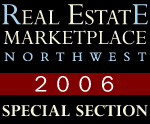
Surveys
DJC.COM
December 14, 2006
UW to offer master’s degree in real estate
University of Washington
The University of Washington will launch a master’s degree in real estate (MSRE) in fall 2008 that will complement the existing specialization in real estate.
This will enable the UW to maintain its status among peer programs and enhance its reputation as it moves into a narrower field, joining the ranks of some 20 real estate degree programs in the United States. More noteworthy, the UW program will be one of a handful of interdisciplinary real estate programs with the potential to transform real estate education.
Increasing education demand
The demand for advanced graduate real estate education stems from several trends. First, the industry is becoming more complex, with capital markets and financial engineering playing an increasing role.
Second, the industry is more dynamic, subject to forces that are dramatically changing the nature, quality and location of real estate needs.
Third, the industry is becoming more global in terms of capital flows, commodity flows, and business activities, which are affecting the supply of and demand for real estate.
Finally, there is growing awareness of the challenges of managing growth while continuing to develop vibrant, affordable and high-quality-of-life environments that are economically competitive. These challenges are particularly acute in the Puget Sound region with its unique landform, rich natural resources and strong economy.
The end result is growing demand for real estate decision makers who can employ team-based problem solving to arrive at sustainable, market-based solutions.
Based on extensive research into existing academic programs and unmet industry needs, the UW’s Runstad Center for Real Estate Studies proposed a new two-year MSRE in 2005. The program contains a strong interdisciplinary dimension and has three major components: 24 core real estate credits, 24 advanced real estate credits and 24 credits from across campus.
To achieve this level of interdisciplinary engagement, the program will coordinate its teaching, research and service activities to foster greater collaboration and cultivate open-minded thinking. By taking some courses from colleges across campus, students will be exposed to best practices in business, law, geography, public affairs, engineering, construction, architecture, forestry and other programs.
Distinguishing attributes
Philosophically, the program is interdisciplinary through its integrated, strategic and applied problem solving conducted through team-based decision making.
It’s also market-oriented through its focus on market structure and segmentation, behavioral economics and drivers, externalities and interventions, spatial/capital interventions, and global and local perspectives along with emerging trends.
The program is focused on value creation, investment and risk management. It covers the full spectrum, from planning through development and operation. It emphasizes research and analysis, ensuring students have the tools and perspectives necessary to excel in the complicated real estate arena.
Finally, the program seeks to balance economic viability and social responsibility, incorporating legal, political, social and ethical considerations to arrive at feasible, sustainable solutions.
The result will be an alumni base trained to take on industry challenges, assume leadership positions to help transform the industry, and help create a more efficient market for investors and tenants while enhancing the built environment.
Program launch
The new program will be accepting applications in fall 2007. The target pool of students will represent a mixture of local, state, national and international candidates. Admission requirements will be based on a number of factors, including prior academic performance, backgrounds, professional experience, and GMAT/GRE scores.
In preparation for the program, faculty and staff are being recruited to create and sustain the program at a national level.
The Runstad Center is refining proposed interdisciplinary course offerings to ensure integration into the curriculum. It is getting strong support from Daniel Friedman (the new dean of the College of Architecture and Urban Planning), departmental colleagues, and an advisory committee representing colleges from across campus. Also, existing courses are being reviewed to ensure they continue to provide a solid foundation and serve the certificate and masters programs in real estate.
Capital campaign
The Runstad Center advisory board is guiding a capital campaign for the master’s degree program, with a $5 million target. The campaign has resulted in creation of a Bob Filley Endowed Chair in Real Estate Studies and establishment of several scholarships to help recruit students.
The UW Graduate School and Higher Education Coordinating Board last summer approved the proposed program. On Sept. 21, the university’s board of regents unanimously approved it.
The Runstad Center advisory board is raising additional operating and endowment funding to help ensure the program’s on-going success.
Jim DeLisle, Ph.D., is the director of the Runstad Center for Real Estate Studies and the Runstad Professor of Real Estate at the University of Washington. He earned his doctorate in real estate from the University of Wisconsin. He has more than 35 years of experience in real estate, with his time split between stints as an academic and a real estate professional.
Other Stories:
- Despite residential setbacks, commercial market is strong
- 8 experts take a look at real estate’s future
- Insurance costs will likely continue their post-Katrina climb
- Bellevue: What a difference a decade makes
- Couple builds a legacy in the U District
- Buyers line up to get south end industrial land
- Tri-county apartment market is hot
- The time’s right to build offices near Lake Union
- High-rises open the door to high design
- Seattle’s simmering office market about to boil
- Robert J. Tindall
- Anthony Downs
- Linda Berman
- Do you have what it takes to get into real estate?
Copyright ©2009 Seattle Daily Journal and DJC.COM.
Comments? Questions? Contact us.